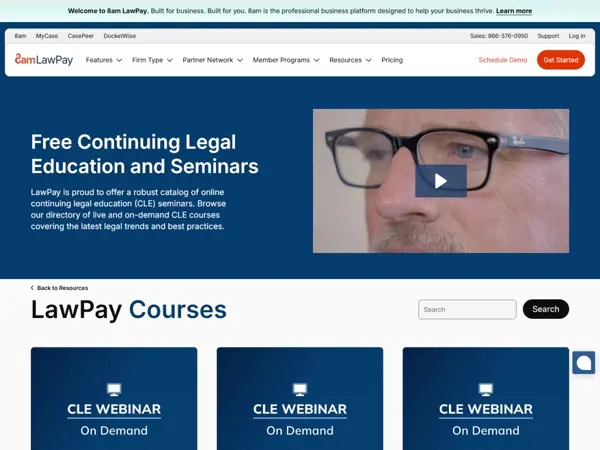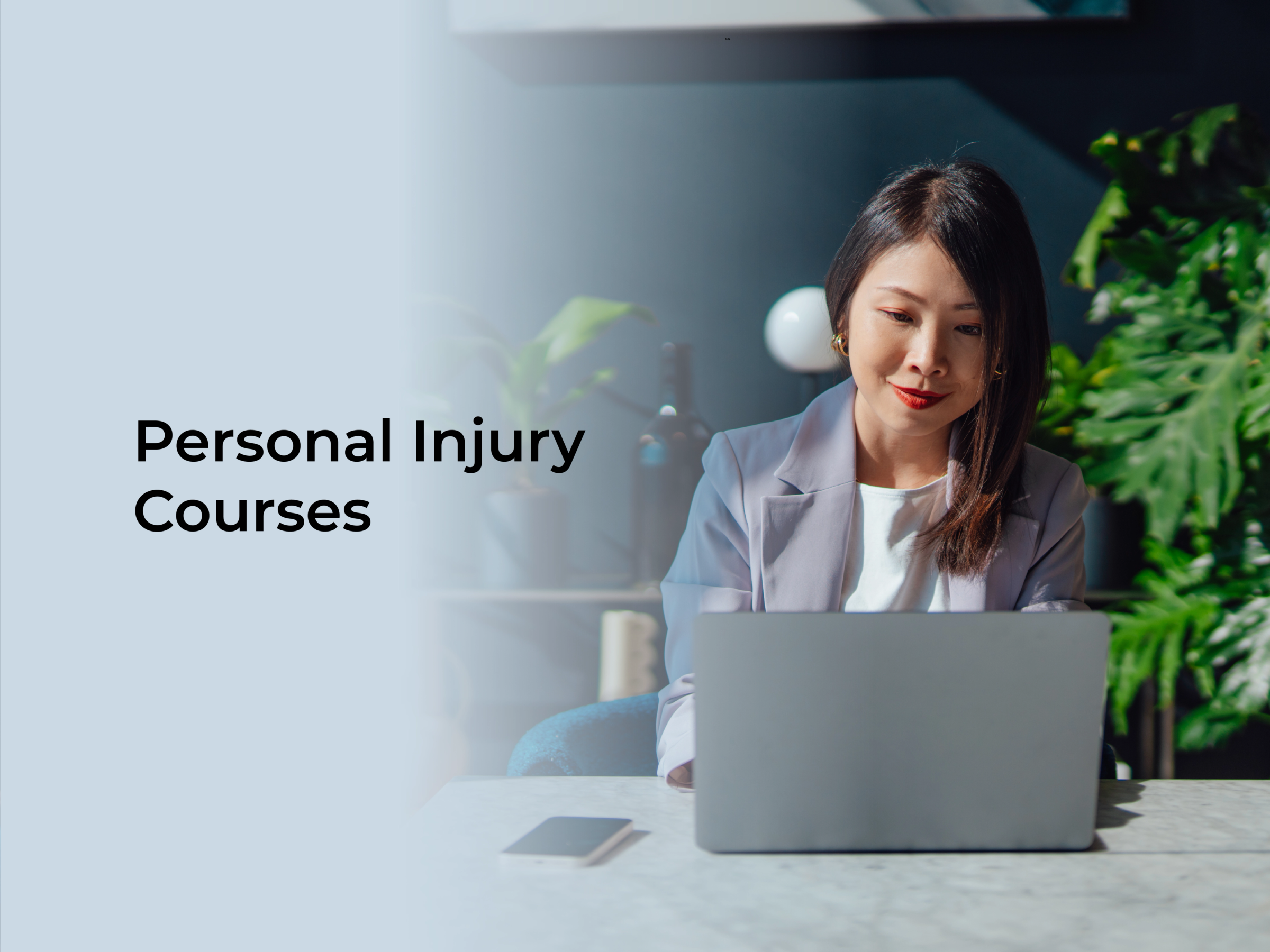Key takeaways
Personal injury law requires continuous training to keep up with legal updates, case strategy, and client expectations.
CLEs and professional development courses help lawyers and paralegals build skills in litigation, intake, communication, and settlement prep.
Business-focused programs offer guidance on enhancing financial oversight, staff management, and operational efficiency.
Legal professionals can use solutions like CasePeer and LawPay to apply their knowledge directly to client work
Personal injury law is a dynamic practice area. New precedents, evolving regulations, and shifting client expectations require lawyers and firm staff to continuously sharpen their legal knowledge, procedural skills, and communication practices. Whether through online training or in-person legal conferences, ongoing education plays a central role in staying current.
For attorneys, professional training creates opportunities to strengthen case strategy, improve outcomes, and meet continuing legal education (CLE) requirements. For paralegals, it builds confidence in areas like client intake, medical record review, and demand letter preparation—all of which directly impact case efficiency and client experience.
Below, we’ve rounded up top-rated personal injury courses for lawyers and paralegals—along with insights on how solutions like 8am™ CasePeer and 8am LawPay help you put those lessons into practice in real client matters.
Why specialized personal injury training matters
Working in personal injury law means adapting constantly. Medical records, treatment protocols, liability standards, and negotiation strategies all evolve over time—and so do the expectations of clients and insurers. Continuous training helps lawyers and paralegals stay grounded in the latest best practices while improving the way they manage cases and communicate with clients.
Regular training also has a direct impact on case outcomes. A better understanding of medical billing can result in more accurate damages calculations. Refined intake processes can prevent errors that delay resolution. Familiarity with ethical and procedural updates can reduce risk. Whether you’re focused on litigation strategy or case support, targeted training builds the skills needed to handle cases more efficiently and with greater confidence.
Training for personal injury attorneys generally falls into two key categories: legal skills and business management. Courses in the first group cover topics such as settlement negotiation, demand letter drafting, medical record review, and trial preparation.
The second category focuses on how to run a firm—covering topics like billing, staff management, and client experience. Since law school doesn’t typically prepare lawyers for the business side of practice, many attorneys benefit from specialized training that helps them build and grow a sustainable firm.
CLEs vs. professional development courses
Not all training is created for the same purpose. Attorneys are required to complete Continuing Legal Education (CLE) credits to stay in good standing with their state bars. These courses often focus on legal ethics, procedural updates, and specific practice areas, such as personal injury litigation. For example, NBI and LawPay offer CLE-approved content that satisfies state requirements while providing useful insights into real-world practice.
Professional development courses, on the other hand, are designed to help legal professionals build practical skills, whether or not they’re tied to CLE requirements. These programs are especially valuable for paralegals and legal support staff, but they can also benefit lawyers looking to expand their operational or client service capabilities. For example, the Center for Legal Studies offers an in-depth course in personal injury work for paralegals, and Paralegal Bootcamp provides hands-on training in case file management, medical records, and pre-litigation strategy. More details on these personal injury classes are provided below.
CLEs vs. Professional Development Courses
Not all training is created for the same purpose. Attorneys are required to complete Continuing Legal Education (CLE) credits to stay in good standing with their state bars. These courses often focus on legal ethics, procedural updates, and specific practice areas, such as personal injury litigation. For example, NBI and LawPay offer CLE-approved content that satisfies state requirements while providing useful insights into real-world practice.
Professional development courses, on the other hand, are designed to help legal professionals build practical skills, whether or not they’re tied to CLE requirements. These programs are especially valuable for paralegals and legal support staff, but they can also benefit lawyers looking to expand their operational or client service capabilities. For example, the Center for Legal Studies offers an in-depth course in personal injury work for paralegals, and Paralegal Bootcamp provides hands-on training in case file management, medical records, and pre-litigation strategy. More details on these personal injury classes are provided below.
Category | CLEs | Professional Development Courses |
Purpose | Maintain attorney licensure and bar compliance | Build practical, job-ready skills |
Required? | Yes, for attorneys | Optional (but beneficial) |
Focus Areas | Ethics, legal updates, practice-area education | Case management, operations, client service skills |
Audience | Attorneys | Paralegals, legal staff, and attorneys |
Examples | NBI CLEs, LawPay CLE-approved content | Center for Legal Studies courses, Paralegal Bootcamp |
Personal injury training courses for paralegals
Whether you’re entering the legal field or looking to specialize, personal injury courses can help paralegals build critical skills that improve case preparation and client support. These programs are designed to strengthen your ability to manage medical records, draft demand letters, coordinate intake and communication, and assist with settlement documentation.
With the right training, paralegals can take on these responsibilities with greater confidence and contribute directly to the success of each case. Below are some examples of popular training courses for paralegals.
1. Center for Legal Studies: Personal Injury for Paralegals
This online course covers the foundations of personal injury law, with modules focused on torts, liability, and medical documentation. Students learn how to review and organize records, prepare demand letters, and assist attorneys with developing effective case strategies. The course is designed for both new and experienced paralegals.
2. Paralegal Boot Camp: Personal Injury Paralegal Boot Camp
This intensive program focuses on the pre-litigation phase of personal injury cases. It includes hands-on instruction in client intake, medical record requests, lien tracking, and settlement demands. The course is structured to help paralegals work independently while supporting attorneys more effectively.
3. NALA: Advanced Personal Injury Course
Offered by the National Association of Legal Assistants (NALA), this advanced course is ideal for paralegals who already have a foundation in legal procedures. Topics include personal injury law principles, medical terminology, and case development. The course is self-paced and aligned with NALA’s certification standards.
4. George Mason University & The Center for Legal Studies: Personal Injury for Paralegals Certificate
This certificate program combines academic instruction with practical legal training. Participants gain a working knowledge of tort law, insurance claims, and medical record review. The course is delivered online in partnership with the Center for Legal Studies, making it accessible to paralegals across the country.
Personal injury courses for lawyers
For attorneys looking to sharpen their skills in personal injury law, professional training offers a way to refine litigation strategy, strengthen client advocacy, and stay compliant with CLE requirements. Whether you’re building a new specialization or updating your knowledge in a fast-changing field, completing personal injury courses online can help you stay competitive and better serve your clients.
Here is an overview of some top-rated training courses for personal injury lawyers:
1. NBI Personal Injury and Negligence CLE Courses
NBI is a well-established CLE provider offering a wide selection of courses focusing on various aspects of personal injury law. Their catalogue includes live webcasts, on-demand recordings, and bundled learning paths.
Format and duration: One-hour modules and full-day seminars are available.
Scope: Topics include case evaluation, damages calculation, insurance negotiation, trial-ready preparation, and more.
Key benefit: Attorneys can earn state-approved CLE hours while refining their skills in personal injury litigation.
2. Lawline Personal Injury and Negligence CLE Courses
Lawline delivers a broad catalog of online CLE modules covering personal injury and negligence topics. You can filter by topic, credit type, format, and more.
Format and duration: On-demand web courses can be completed at your own pace.
Scope: Courses cover core litigation themes and niche topics, including offerings on ERISA lien resolution and maritime personal injury cases.
Key benefit: Flexible online access makes it practical for busy attorneys to earn credits and sharpen their personal injury expertise.
3. American Bar Association Learning Center
The ABA offers a large library of CLE resources, including many relevant to personal injury law. For its members, hundreds of programs are available—some at no additional cost beyond the membership fee.
Format and duration: Courses include a mix of live webinars, on-demand modules, and in-person events. Formats cater to both short-form updates and multi-session learning.
Scope: While not exclusively PI-focused, the library includes modules on liability, trial tactics, ethics, and other issues that impact personal injury practice.
Key benefit: Ideal for attorneys who want a one-stop resource for CLE compliance and practice-area refreshers within a reputable national professional association.
Business management training for personal injury lawyers
To run a successful personal injury law firm, you need strong financial literacy, effective management skills, and a clear understanding of how to deliver a consistent client experience. These capabilities shape how efficiently your firm operates, how clients perceive your service, and how well you’re positioned to grow.
Here are some training resources that can help you build your knowledge on the business side of running a PI firm:
LawPay CLEs
LawPay offers a catalogue of live and on-demand CLE seminars that cover practical business issues for law firms in all practice areas—from billing and financial reporting to modern client payment systems. These learning opportunities can help attorneys establish more effective systems for invoicing, collections, and revenue tracking.

CEO Lawyer Bootcamp
CEO Lawyer Bootcamp is a training program created for leadership teams at personal injury firms. It covers pre-litigation workflows, team structure and KPIs, and scaling support staff and virtual assistants.
Personal Injury Lawyers Marketing and Management Association (PILMMA)
PILMMA offers courses for PI attorneys focused on marketing strategy, firm operations, and management. Course content is geared toward maximizing case flow, optimizing intake teams, and creating efficient back-office operations.
8am webinars
Attorneys and staff looking for flexible training options can explore live and on-demand webinars offered by 8am and its family of legal solutions: CasePeer, LawPay, and MyCase. Designed for legal professionals across a wide range of practice areas, these sessions cover practical topics like intake optimization, billing workflows, and financial management—along with specialized content focused on personal injury case strategy.

Leveraging personal injury industry data
Personal injury firms can gain a significant edge by using industry data strategically. From identifying high-growth practice areas to strengthening internal operations, data analysis reveals patterns that can help you make smarter decisions about staffing, client service, and case strategy. It also gives firms a way to monitor market shifts, evaluate performance benchmarks, and stay ahead of competitors.
These types of insights help legal professionals identify where to focus their training. If client updates are falling through the cracks, staff may benefit from courses that build communication and case management skills. If settlement timelines are trending longer, attorneys might consider training in areas like negotiation strategy or claims analysis.
Below are some examples of how your firm can leverage data from resources like the 8am Personal Injury Insights Report 2025 to identify priorities for staff training and operational improvements:
Technology adoption rates
8am insight: 37% of personal injury professionals personally use generative AI, and 36% of firms expect some administrative functions will be replaced by AI.
Process improvement: To keep pace with the industry’s growing adoption of this technology, firms should evaluate where AI can reduce time spent on routine tasks. Tools like 8am IQ include built-in tools for automating workflows, reviewing legal documents, and surfacing valuable insights—helping teams work faster and more consistently.
Training priority: Focus on training staff to use generative AI tools responsibly and effectively—especially for tasks like summarizing treatment notes and generating first drafts of correspondence. Build internal guidelines to ensure accuracy, compliance, and human oversight.
Client communication trends
8am insight: Firms that provide clients with regular case updates resolve cases 17% faster than those that do not.
Process improvement: Streamlining how and when clients receive updates can help reduce delays, improve client satisfaction, and free up time spent responding to follow-up questions. Using automated task reminders and communication logs in CasePeer, attorneys can deliver client updates consistently at each stage of a case.
Training priority: Train attorneys and staff to use tools that automate routine client outreach to maintain consistency without increasing manual work.
Payment and collections efficiency
8am insight: 45% of personal injury firms report that accepting credit and debit cards increased their monthly collection rates.
Process improvement: Expanding payment options with legal billing solutions like LawPay can help firms shorten time to payment and reduce administrative follow-up. Features like scheduled invoices, secure payment links, and Pay Later fee financing options can all boost cash flow.
Training priority: Ensure staff, legal assistants, and office managers are trained in payment platform features and reporting tools. Training should also include how to communicate payment options clearly to clients and how to set up recurring or scheduled billing.
Building legal expertise and practice efficiency
Professional development doesn’t just build individual skills—it improves how your firm operates as a whole. In a fast-changing field like personal injury law, regular training helps lawyers and paralegals stay sharp, optimize outcomes, and deliver a better experience for clients.
The next step is putting that knowledge to work. CasePeer gives personal injury firms the tools to manage every stage of a case with greater clarity and control—from intake and treatment tracking to settlement prep and communication.
See how CasePeer can help you apply what you’ve learned—schedule a demo today.
About the author
Rob Heidrick is a Senior Content Strategist for 8am, a leading professional business solution. He covers the latest advancements in legal technology, financial wellness for law firms, and key industry trends.

